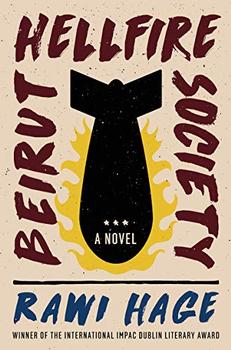
by Rawi Hage
A searing and visionary novel set in war-torn 1970s Beirut, from an author praised for his "fierce poetic originality" (Boston Globe) and "uncompromising vision" (Colm Tóibín).
On a ravaged street overlooking a cemetery in Beirut's Christian enclave, we meet an eccentric young man named Pavlov, the son of a local undertaker. When his father meets a sudden and untimely death, Pavlov is approached by a colorful member of the mysterious Hellfire Society―an anti-religious sect that, among many rebellious and often salacious activities, arranges secret burial for outcasts who have been denied last rites because of their religion or sexuality.
Pavlov agrees to take on his father's work for the society, and over the course of the novel he becomes a survivor-chronicler of his embattled and fading community at the heart of Lebanon's civil war. His new role introduces him to an unconventional cast of characters, including a father searching for his son's body, a mysterious woman who takes up residence on Pavlov's stairs after a bombing, and the flamboyant head of the Hellfire Society, El-Marquis.
Deftly combining comedy with tragedy, gritty reality with surreal absurdity, Beirut Hellfire Society asks: What, after all, can be preserved in the face of certain change and imminent death? The answer is at once propulsive, elegiac, outrageous, profane, and transcendent―and a profoundly moving fable on what it means to live through war.
"Beirut Hellfire Society crackles with the kinetic energy of a dancer…The absurd volume of deaths is also tempered by Hage's signature dark humor and stylistic playfulness." - Toronto Star
"A wild, viscerally exciting and often bleakly funny novel of ideas. Comparisons aren't always useful, but this reviewer thought of a work…equally unflinching in its de-romanticizing of a subject most of us prefer to avoid: Cormac McCarthy's Blood Meridian." - Montreal Gazette
"Beirut Hellfire Society is a novel of tragic beauty and dark humour that is comfortable with contradiction and charged with probing philosophical insights and the luminosity of Arabic poetry. It's a timeless story of the outcast whose act of witness chronicles the world he observes. It is also a testament to love for life. Hage reminds us of what it takes for a novel to endure on the level of both form and content." - Quill & Quire (starred review)
"A well-turned seriocomic tale about death in a place where it's become inescapable." - Kirkus Reviews
"At times brutally intense, Beirut Hellfire Society unsettles detached views of war. There are, it insists, real and horrible consequences of wars that cannot be ignored, forgotten, or romanticized. Here, escape into perceived comforts and safety is not an option." - Foreword Reviews
"Place: Beirut. Time: 1970s. But Rawi Hage's Beirut Hellfire Society is, actually, deeply set in any place consumed by killing and death during any time in human history. Fire is Beirut Hellfire Society's elemental core―inherited fires of grief and sorrow, justice and love. Fantastically framed, its envisioned images and scenes burn with a mythic intensity not easily forgotten. Truly a masterpiece." - Lawrence Joseph, author of So Where Are We?
This information about Beirut Hellfire Society was first featured
in "The BookBrowse Review" - BookBrowse's membership magazine, and in our weekly "Publishing This Week" newsletter. Publication information is for the USA, and (unless stated otherwise) represents the first print edition. The reviews are necessarily limited to those that were available to us ahead of publication. If you are the publisher or author and feel that they do not properly reflect the range of media opinion now available, send us a message with the mainstream reviews that you would like to see added.
Any "Author Information" displayed below reflects the author's biography at the time this particular book was published.
Rawi Hage was born in Beirut, Lebanon, and lived through nine years of the Lebanese civil war during the 1970s and 1980s. He immigrated to Canada in 1992 and now lives in Montreal. His first novel, De Niro's Game, won the IMPAC Dublin Literary Award for the best English-language book published anywhere in the world in a given year, and has either won or been shortlisted for seven other major awards and prizes, including the Scotiabank Giller Prize and the Governor General's Literary Award. Cockroach was the winner of the Paragraphe Hugh MacLennan Prize for Fiction and a finalist for the Governor General's Award. It was also shortlisted for the Rogers Writers' Trust Fiction Award and the Giller Prize. His third novel, Carnival, told from the perspective of a taxi driver, was a finalist for ...
Name Pronunciation
Rawi Hage: ROW-ee HAWZH. First syllable is pronounced like the word for a fight or disturbance, not like what you do in a boat.




No pleasure is worth giving up for the sake of two more years in a geriatric home.
Click Here to find out who said this, as well as discovering other famous literary quotes!
Your guide toexceptional books
BookBrowse seeks out and recommends the best in contemporary fiction and nonfiction—books that not only engage and entertain but also deepen our understanding of ourselves and the world around us.